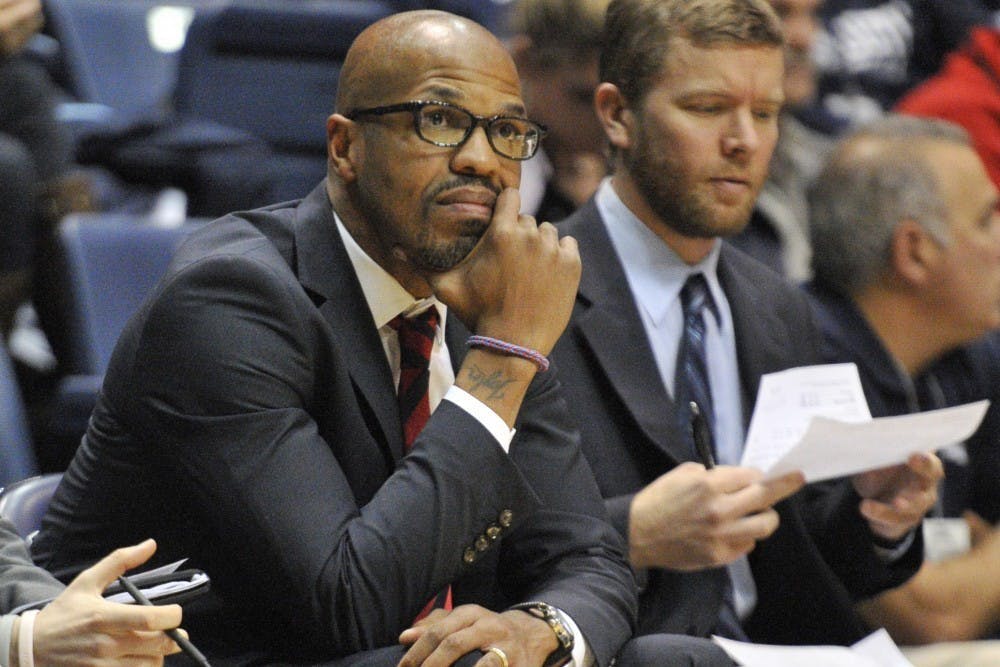
The scandal began on July 20, 2018 — a full year ago. Then, Jerome Allen was a former Penn men’s basketball coach, a Penn Athletics Hall of Famer, and known as one of the best Penn men’s basketball players of all time. Now, a year later, Allen has been convicted of a federal crime, is no longer in the Hall, and is synonymous with one of the biggest scandals to rock the Ivy League in recent memory.
A year ago, Allen was first implicated in a bribery admissions scheme. Identified initially as “Coach 2” in court documents, Bloomberg was the first to report that Allen had accepted bribes from Philip Esformes in order to recruit his son Morris to Penn in 2015.
Within days, Penn launched an investigation into Allen’s conduct. The University has still not publicly discussed the investigation’s scope or findings.
“Penn Athletics continues to fully cooperate with the NCAA regarding the Jerome Allen case. As the case is still being processed, we are unable to comment further at this time,” Kevin Bonner, Senior Associate Athletic Director of Governance and Administration wrote in a statement on Thursday.
Allen’s legal case has now ended after his guilty plea and subsequent sentencing on July 1. He was sentenced to 600 hours of community service and a fine of $202,000 in addition to an $18,000 forfeiture judgement — in addition to four years of probation and six months of house arrest. His house arrest will not affect his ability to work for the NBA’s Boston Celtics, where he is an assistant coach.
Bonner’s most recent statement echoed previous Penn Athletics statements dating back to February.
It was then, more than five months ago, that Athletics Director M. Grace Calhoun sat down with The Daily Pennsylvanian.
“Penn thoroughly reviewed everything surrounding the situation, and as soon as we're at liberty to proceed forward, after that part of the trial at least, we will,” she said.
Allen’s case, without precedent when the story broke a year ago, has since become entangled in the narrative of the larger Operation Varsity Blues sandal uncovered by the FBI. The Allen case was not mentioned in the original reports of the Varsity Blues scandal surrounding Rick Singer, who bribed coaches and falsified test scores to get students admitted as athletes at schools across the country. However, on July 11, Ben Baskin of Sports Illustrated reported that Philip Esformes had been in contact with and given money to Singer.
It remains unclear what, if anything, the NCAA has done about the Jerome Allen scandals — it has yet to announce an investigation or any sanctions. Penn Athletics has repeatedly declined to comment on the NCAA’s or Ivy League’s involvement in the case.
However, based on the similarity between the Varsity Blues and Jerome Allen cases and the way the NCAA has handled recent scandals, it seems likely that any sanctions or investigations into Penn men’s basketball or Penn Athletics will come after the Penn investigation ends. The NCAA could also lump the Jerome Allen scandal in with Varsity Blues given the similarities in the cases.

Former Penn men's basketball coach Jerome Allen. (File Photo)
While Allen has admitted to breaking various NCAA rules at Penn in court testimony, there has been no indication from Penn, the media, or any governing bodies that Penn Athletics will face punishment.
“It really comes down to whether the school knew or should have known,” Miami-based collegiate sports lawyer Jason A. Setchen said in March. “If they didn’t know and couldn’t have known and [Allen] really did a serious job of trying to conceal it, then the school’s culpability obviously goes down dramatically to the point where they might not even have an NCAA violation.
“It’s [a question of] how did it happen and did the school know about it. Someone in compliance: Should they or could they have done more?”
[March 14, 2019: Penn Athletics declines to further comment on Jerome Allen investigation]
According to Baskin, Allen made monthly trips to Miami to visit Morris, which became an open secret among the team. Allen even brought four Penn players to Miami to practice with Morris Esformes before Morris was admitted to Penn. Baskin reports that the open secret had become so open that Allen was offered a bribe on a second occasion from a youth coach implicated in the Varsity Blues scandal. He denied it.
Steve Donahue replaced Allen as head coach of the program with Ira Bowman — an assistant coach who had access to an account with Esformes’ money in it according to Allen’s testimony — still on staff. Donahue quickly realized Morris was not good enough to make varsity, leading to Morris’ departure from the team.
While the pieces were all there for Donahue, the compliance department, or an administrator to put together, there is no definitive proof that anyone in Penn Athletics knew of the bribes before the Bloomberg report a year ago.
[March 21, 2019: Ira Bowman, former assistant to Jerome Allen, implicated in Penn admissions fraud]
Penn Athletics’ plausible deniability is aided by the circumstances of the Ivy League’s Academic Index. Because all incoming Ivy recruiting classes must collectively meet a certain academic threshold, many coaches will balance athletically gifted recruits below the average AI score required with academically gifted athletes that are unlikely to see much playing time. It was not unusual for a player like Esformes — academically gifted but not at the same athletic standard as his teammates — to be a recruit.
Similarly, the lack of oversight of Allen’s priority recruit lists was standard in NCAA athletic departments, according to court testimony from then-Penn associate athletic director Alanna Shanahan.
[ July 1, 2019: Former Penn coach Jerome Allen avoids jail time in admissions bribery scandal]
Penn Athletics can still be found culpable even if nobody other than Allen and Bowman had knowledge of the bribes. The NCAA has doled out sanctions before when an athletic department has failed to maintain “an atmosphere of compliance” or “lack[ed] institutional control.” If the NCAA or Ivy League determines that Penn Athletics should have known about the scandal, that could be enough.
Adding to the complexity is a potential statute of limitations issue if the investigation continues indefinitely. According to the NCAA website, the typical statute of limitations for violations is four years, which would be sometime in 2019. There is, however, an that may apply if the NCAA finds that the rules violation consisted of “a blatant disregard for certain fundamental rules (recruiting, extra benefits, academics, ethical conduct).”
“There are clearly NCAA violations. There’s no doubt that the violation occurred,” Setchen said in March. “The question now would be what is [Penn's] culpability in that and what would be the penalty for it.”
The Daily Pennsylvanian is an independent, student-run newspaper. Please consider making a donation to support the coverage that shapes the University. Your generosity ensures a future of strong journalism at Penn.
Donate






